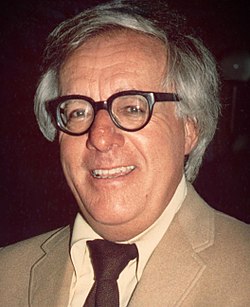Ray Bradbury Quote
I think all of us felt, I said, at least once in our lives, when we were young, we could go over there, after reading the bull stuff in the Spanish stories, that we could go over there and fight. Or at least jog ahead of the running of the bulls, in the early morning, with a good drink waiting at the other end of the run, and your best girl with you there for the long weekend. I stopped. I laughed quietly. For my voice had, without knowing, fallen into the rhythm of his way of saying, either out of his mouth, or from his hand.
Ray Bradbury
I think all of us felt, I said, at least once in our lives, when we were young, we could go over there, after reading the bull stuff in the Spanish stories, that we could go over there and fight. Or at least jog ahead of the running of the bulls, in the early morning, with a good drink waiting at the other end of the run, and your best girl with you there for the long weekend. I stopped. I laughed quietly. For my voice had, without knowing, fallen into the rhythm of his way of saying, either out of his mouth, or from his hand.
Related Quotes
The downfall of the attempts of governments and leaders to unite mankind is found in this- in the wrong message that we should see everyone as the same. This is the root of the failure of harmony. Bec...
C. JoyBell C.
Tags:
color, culture, difference, differences, equality, government, harmony, human, humanism, humanity
About Ray Bradbury
Ray Douglas Bradbury (US: BRAD-berr-ee; August 22, 1920 – June 5, 2012) was an American author and screenwriter. One of the most celebrated 20th-century American writers, he worked in a variety of genres, including fantasy, science fiction, horror, mystery, and realistic fiction.
Bradbury is best known for his novel Fahrenheit 451 (1953) and his short-story collections The Martian Chronicles (1950), The Illustrated Man (1951), and The October Country (1955). Other notable works include the coming of age novel Dandelion Wine (1957), the dark fantasy Something Wicked This Way Comes (1962) and the fictionalized memoir Green Shadows, White Whale (1992). He also wrote and consulted on screenplays and television scripts, including Moby Dick and It Came from Outer Space. Many of his works were adapted into television and film productions as well as comic books. Bradbury also wrote poetry which has been published in several collections, such as They Have Not Seen the Stars (2001).
The New York Times called Bradbury "An author whose fanciful imagination, poetic prose, and mature understanding of human character have won him an international reputation" and "the writer most responsible for bringing modern science fiction into the literary mainstream".
Bradbury is best known for his novel Fahrenheit 451 (1953) and his short-story collections The Martian Chronicles (1950), The Illustrated Man (1951), and The October Country (1955). Other notable works include the coming of age novel Dandelion Wine (1957), the dark fantasy Something Wicked This Way Comes (1962) and the fictionalized memoir Green Shadows, White Whale (1992). He also wrote and consulted on screenplays and television scripts, including Moby Dick and It Came from Outer Space. Many of his works were adapted into television and film productions as well as comic books. Bradbury also wrote poetry which has been published in several collections, such as They Have Not Seen the Stars (2001).
The New York Times called Bradbury "An author whose fanciful imagination, poetic prose, and mature understanding of human character have won him an international reputation" and "the writer most responsible for bringing modern science fiction into the literary mainstream".
